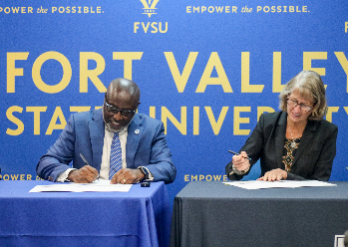
Photo courtesy of Fort Valley State University
Colleges and universities continually strive to better serve and prepare students for their futures, and what better way to do that than by collaborating with other institutions — near or far. In October, Utah State University (USU) formally announced a partnership with Fort Valley State University (FVSU), an HBCU in Fort Valley, Georgia, and students are already reaping the benefits.
The idea for the collaboration was devised by Ty Couey, President of the National Historically Black Colleges and Universities Alumni Associations. Couey saw it as an opportunity to “develop a predominately white institution (PWI)/HBCU holistic inclusive program for college students, which becomes a national model, i.e., truth, justice, and awareness.”
The idea was a welcome one as the universities already had previous successful collaborations over the past two years.
“With our shared history as land-grant institutions and similar research interests and educational goals, it made sense to formalize that relationship into an official partnership,” explained Robert Wagner, executive vice president for USU. Both schools have agricultural roots and continue to excel in that area.
“While our two schools have these things in common, we at USU feel we can learn a lot from an HBCU that is focused on teaching and learning with a successful and broad research agenda,” Wagner continued. “As Utah’s population increases in diversity, we are actively looking for ways to increase educational and research opportunities, along with support resources for under-represented (or underserved) populations in our state.”
FVSU President Paul Jones, Ph.D. (who happens to be a USU alumnus), said in a recent press release, “I am ecstatic to have two institutions I love and cherish working together to advance opportunities that will have a positive impact on students, research, and training.”
Through the partnership, students at both universities will have opportunities otherwise not available to them.
As a PWI, one of the benefits of the partnership for USU students is the opportunity to learn alongside and interact with diverse individuals. “Under the leadership of President Noelle Cockett, USU has made diversity, equity, and inclusion university-wide priorities,” said Wagner. “Building relationships with and learning from people with a variety of backgrounds and experiences is extremely important, and that will happen through student and faculty exchanges, joint research projects, and other programs our universities develop together.”
The partnership is fluid — the ways in which the two universities will collaborate aren’t set in stone. Instead, the partnership serves as a commitment to working together and providing opportunities for one another’s students and faculty when it makes sense. Some of the collaborations already happening include:
- FVSU students participated in summer research internships at USU.
- USU students have had guest lectures from FVSU faculty members.
- FVSU students have been invited to apply for a summer research internship program in Washington, D.C. organized by USU.
“This partnership provides an opportunity for students to learn more about other campus cultures and form new friendships,” says Govind Kannan, vice president of economic development and land grant affairs at FVSU, who leads the charge for the partnership. “Students who take advantage of the internship programs can sharpen their skills such as leadership, teamwork, and communication and better prepare themselves for fulfilling careers.”
Discussions are ongoing regarding additional areas for collaboration between the two universities, including — according to Wagner — a focus on student support and success, specifically through student orientation, advising, career design, and academic belonging.
Leaders from both institutions hope that this partnership can inspire similar agreements among other colleges and universities. There is power in collaboration, especially in an era when students are seeking more value from their college education and a greater return on investment.
“Just like having individuals interact with and learn from people with different experiences is valuable, the same is true with academic institutions,” Wagner explains. “A partnership like this can allow both institutions to broaden their perspectives and inspire ways to better serve students and faculty.”
Disclaimer: HigherEdJobs encourages free discourse and expression of issues while striving for accurate presentation to our audience. A guest opinion serves as an avenue to address and explore important topics, for authors to impart their expertise to our higher education audience and to challenge readers to consider points of view that could be outside of their comfort zone. The viewpoints, beliefs, or opinions expressed in the above piece are those of the author(s) and don’t imply endorsement by HigherEdJobs.

